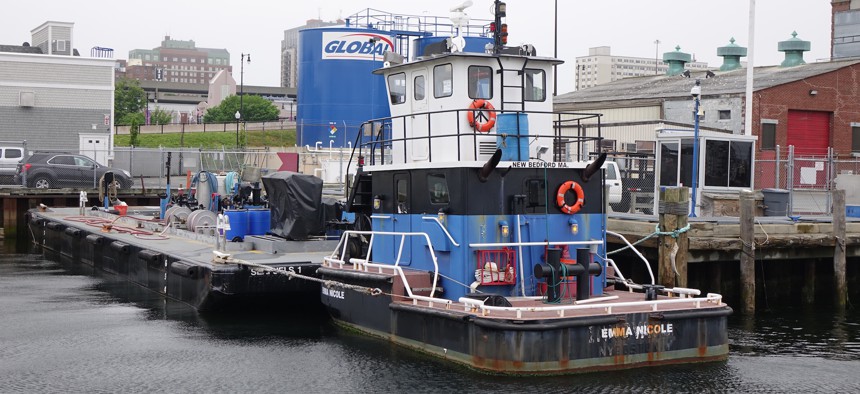Connecting state and local government leaders
New Bedford, Mass., Mayor Jonathan Mitchell pushes for infrastructure investments and a better business climate.
NEW BEDFORD, Mass. — This old port city at the mouth of the Acushnet River has seen its share of boom and bust cycles, from the time of the lucrative trade in whale oil to the heights of the New England textile boom to the declines that followed in their wakes.
New Bedford can’t match the torrid pace of growth in Boston. But under three-term mayor Jonathan F. Mitchell, it has made a remarkable recovery from the 2008 recession, and now seems poised for continued growth.
It is blessed with a deepwater port that supports a thriving seafood business, the largest in the country. Residents hope the port will become a key hub of manufacturing for the wind-power industry.
In a recent interview in New Bedford’s picturesque old city hall, Mitchell talked about government’s role in his city’s economic revival, describing a slow but steady series of steps to help the private sector. But he is worried that he doesn’t have enough financial flexibility to make needed investments, stressing that more than 70 percent of his city’s tax revenues pay for programs mandated by the state.
As a longtime visitor to New Bedford, with family in the area, I’ve observed much progress, from the cleanliness and commercial vitality of the historic downtown to the new pedestrian and biking pathway along the top of the harbor breakwater, offering scenic views, to the construction of a $55 million new academic science facility at the southern end of town.
Mitchell has been driving a lot of this. He’s pushing for, and getting some, vitally needed funding for dredging of the harbor. He’s been investing in the historic district, and planning new measures to bring young entrepreneurs to work there. He talks about “innovation districts” that he hopes will make New Bedford a part of the 21st century knowledge economy. He has been working hard to improve the city’s school system, which was on the brink of a state takeover when he took office in 2012.
Mitchell, 48, was born and grew up here, the son of public school teachers. His family has roots in the local fishing industry. A Harvard graduate, he went on to George Washington Law School. He worked as a state and federal prosecutor, before coming home to New Bedford to run for, and narrowly win, the mayoral election in 2011. An October 2016 CommonWealth magazine profile described him as “intense, smart and ambitious [and] not your typical back-slapping pol.” He’s been approached more than once to run for statewide office, he told me, and he’s open to the idea.
Fighting Decline
In a state-of-the-city address in March, Mitchell opened with the defiant attitude he takes toward talk of decline in his city.

“When I first took office,” he said, “many were writing off America’s older industrial cities—and for good reason. In the wake of the 2008 financial crisis, rampant housing foreclosures, widespread job loss and declining tax revenue left many cities struggling to provide basic services and grow jobs. Here and elsewhere, it was easy to see the glass as half-empty.” But New Bedford, he declared, “didn’t buy the conventional wisdom.”
The 2010 census put New Bedford’s population at 95,072, of whom 38 percent are of Portuguese descent. Median household income in 2015, the Census Bureau reports, was $37,574—far below the statewide average of $68,653. The city is confined to just 20 square miles and has three miles of coastline. New Bedford had 42,079 jobs and 3,272 businesses in 2015, according to state-collected data.
As Mitchell took office, the unemployment rate in New Bedford was 9.9 percent—down from 14.2 percent in 2010. Last November, the city saw its jobless rate drop to 3.7 percent. It has since ticked up to 5.7 percent in May. The statewide rate in May was 4.2 percent.
From the time he took office, Mitchell has preached a message of self-reliance. He has pressed for federal and state aid to revitalize the port and for other projects at the same time. But he has put much of his energy into mobilizing the community to plan and help pay for improvements that can bring back greater prosperity.
In 2014, he asked many of the region’s business and community leaders to serve as members of the New Bedford Regeneration Committee, tasking it with devising strategies for economic growth.
The committee’s final report was intended, its authors wrote, “to signal to both private investors and government officials outside the region that New Bedford has a clear set of objectives.”

The committee’s drive for economic growth lives on in city government, where an augmented planning staff runs the Regeneration Project. It has produced four deeply researched reports on education and workforce development, the port and other economic growth strategies.
In our interview Mitchell described the challenges he has confronted.
“New Bedford has been a city that at best has ridden the wave of the national business cycle,” Mitchell said. “I say at best because we have tended to emerge from recessions late and to go back into them early. So effort here is really to enable city to grow steadily over time by facilitating the diversification of the economy and investing in strategic assets and providing a stable city government that folks can rely on….
“What we try to do in government, to the extent that government can, is to create a healthy business environment by working closely with small businesses and businesses of every size and doing so in a transparent way. Folks have to interact with government. And we try to establish a healthy and direct and transparent dialog so they can have confidence that this is a stable environment in which to invest.”
Mitchell ticked off major projects he has pursued during his five years in office.
The Port
“Our big initiatives include more investments in the port, especially those assets that can facilitate the development of the offshore wind industry here,” he said. One big project has been the harbor’s Marine Commerce Terminal, a $113 million facility financed by the state. The Massachusetts Clean Energy Center, which manages the terminal, describes it as “a multi-purpose facility designed to support the construction, assembly, and deployment of offshore wind projects, as well as handle bulk, break-bulk, container shipping and large specialty marine cargo.”
The terminal did not attract much business at first, but in September 2016, three offshore wind developers signed an agreement to use it. As The Boston Globe reported, the agreement came just about a month after Governor Charlie Baker signed a new law pushing electric utilities to buy offshore wind power—as a way to kick-start a new industry in the state.

Dredging of the port has been another priority. “It has been 60 years since the port was entirely dredged,” Mitchell said. Two years ago, the Army Corps of Engineers financed dredging in the “federal channel” leading into the harbor. That’s a good start, said Mitchell, but more needs to be done to accommodate large vessels. Most pressing now, though is more dredging around the piers and berths where ships tie up. “We have businesses that are willing to expand around various bulkheads in the harbor if the dredging gets done,” said Mitchell. The state and the businesses themselves will provide the bulk of the financing, he added.
Mitchell is also pursuing funding to replace an ancient swing bridge that’s a bottleneck for ships moving in and out of the inner harbor.
Promoting New Business
Mitchell is excited about a new deal the city announced in May with MassDevelopment, the state’s economic development agency, to take 100 acres of the Whaling City Golf Course for use as an industrial park. A city-owned nine-hole course will remain on the site.
Manufacturing is important in New Bedford, providing about 15 percent of employment. But Mitchell has also been investing in projects he hopes will bring knowledge workers to the city.
“We are looking for ways to put together a plan to really cultivate entrepreneurship in the city,” he said. “We know that New Bedford needs to be a place where the knowledge economy of the 21st century can thrive. We also know that entrepreneurship these days increasingly takes root in walkable urban centers like our downtown. So we will be rolling out a plan in the next few months that will facilitate the development of startups in the city.”
Mitchell has been laying the groundwork for such a plan by encouraging preservation of historic buildings and cleaning up the downtown areas where they are centered. A huge attraction in the area is the New Bedford Whaling Museum. Its centerpiece is a half-scale model of a whaling vessel, lovingly built by descendants of the ship captain Gabriel Sistare who emigrated from the Basque region of Spain in 1775. Gabriel’s grandon, Burr Sistare, was a whaling captain who led an ill-fated voyage in 1845. The Sistares remain prominent in the area: Deborah Sistare, my sister-in-law, was for many years a dentist in neighboring Fairhaven. Her daughter Dakota is a teacher in a local school and she lives with her mother, her husband and her son in the old family house overlooking New Bedford harbor.
Mitchell said that “investment in historic preservation is going to be ramped up in a big way in next few months.” The city in 2015 adopted a Community Preservation Act, allowing imposition of a fee on New Bedford businesses. “We’ve raised a considerable amount of money in last two years, about $2 million, that we hope will leverage more private sector dollars to preserve important historic properties,” said the mayor. The effort will focus in and around the New Bedford Whaling National Historical Park established by an act of Congress in 1996. The 13-block area surrounds the Whaling Museum, which itself recently opened a privately financed $8 million expansion, greatly increasing space for educational programs.
The city's downtown has seen a surge of investment in small restaurants, to the point where the area, until recently dark and dead at night, is thriving with people who drive in knowing that they’ll be able to find a good meal without a reservation.
Mitchell hopes the knowledge economy will grow in what he is calling “innovation districts” in the downtown area. These he described as ”developing around an anchor institution those things that would cultivate a start-up environment—makerspaces or incubators, along with some residential density, and small businesses, coffee shops and the like so that people can feel they are part of vital community engaged in active exchange of ideas.”
Ideas and innovation are also on the move in southern New Bedford, where the Commonwealth of Massachusetts has made a $55 million investment to expand the footprint of UMass-Dartmouth’s School for Marine Science & Technology (SMAST). The school says it supports “cutting-edge research projects [that] emphasize interdisciplinary basic-to-applied marine sciences and the development of innovative technologies.” Mitchell hopes that the expansion will spawn “in effect a campus that can lead to commercialization of some of the research that is done at SMAST, and generate more activity in that part of the city.”
Marine Monument
Ever the advocate for the city’s vital fishing industry, Mitchell has voiced skepticism about the Obama administration’s decision, announced last September, to designate 4,913 square miles off the New England coastline as a new marine national monument. The new Northeast Canyons and Seamounts Marine National Monument lies 130 miles off the southeast coast of Cape Cod, and has been for many years an active fishery.

“My feeling was that the decision had not been subjected to the level of rigor that one would hope for in a decision so permanent,” Mitchell said.“It hadn’t had much in the way of scientific peer review or stakeholder input that might have included fishing business owners. So with the change of administrations we’ve had some discussions with the House Natural Resources Committee as well as with the White House about fixing the problem.”
“I would like to see the process start over,’ Mitchell said. “I don’t object to use of the Antiquities Act to preserve areas of the ocean that are ecologically fragile. But we just need to have a process that takes into consideration the long-standing commercial interests in the North Atlantic that are so important.”
Public Education
Remaking New Bedford’s K-12 education has been a long-range project for Mitchell. A few years ago, he hired a new superintendent, Pia Durkin, who had earned a reputation as a turnaround artist in the town of Attleboro. She made a highly controversial decision to require teachers reapply for their jobs, and presided over a large turnover in staff. The public schools are essential to upward mobility in Mitchell’s highly diverse city, the mayor believes, but he has struggled to find the money to meet state-mandated local contributions to the costs of the system.
“Urban education is a challenging undertaking,” Mitchell said. “We have been in midst of a total reform of our school system for five years now. The New Bedford school district had been allowed to fall into disrepair over many years to the point where the state threatened to take it over when I got into office. We’ve gone about the business of putting it all back together, and that’s hardly an overnight exercise. So we are seeing some really good trends. The dropout rate has gone down a lot. The four-year graduation rate has gone from 55 percent to just over 70 percent now. Test scores in most of our elementary schools have been coming up steadily." The current challenge, he said, is at the middle- and high-school levels.
Finance and Relations With the State
As the education funding problem suggests, Mitchell has struggled with the city budget throughout his tenure.
He says proudly: “We have stabilized finances along the way. The city now has the highest bond rating in its history, AA-, which for cities of our size is a very respectable rating from S&P.”
But it has been a tough slog.
In his state-of-the-city address, Mitchell spoke of the belt-tightening he has done over the years. Despite that, “and despite all the economic growth in our city, we are still pinching pennies,” he said. “We’ve had to resort to measures like … leaving vacant positions open, [closing] fire stations, and budgeting our school department at the state minimum level.”
In our interview, Mitchell elaborated: “My concerns have to do with the threat that non-discretionary spending mandated by the state will continue to crowd out traditional municipal services, including public safety and schools and pretty much everything else that cities are expected to do. My concern is hardly a novelty: there are mayors in states across America who lament how little freedom of action they have to deal with financial problems that stare them right in the face.
“Look at the problems of mid-sized cities in Connecticut... the likes of New Haven, Waterbury, Hartford and Bridgeport. In a state that is the most affluent per capita in the country, they shouldn’t be having the problems they are having. It’s because of bad state policy.” (As Route Fifty has reported, Hartford and the others are not far from bankruptcy.)
“I have had this conversation with lots of folks here in Massachusetts, including the governor, about how we should be heeding the warning in Connecticut. If it’s happening in Connecticut it could happen here, given how rigid the rules around [public employee] pensions are in Massachusetts. It’s not just pensions; it’s health care as well. So we just have very little authority to change the rules around eligibility and benefit levels in a way that would be reasonable to us to stabilize our finances.
“The only alternative we have is to reduce workforce. That’s the only arrow in our quiver. So here in New Bedford we have a much smaller police department than we had 10 years ago. It was 300 at peak, and is 262 right now. Same with the fire department: it was over 250 and is now down to 216. So I am very concerned. Our overall municipal workforce over the last 10 years is about 20 percent smaller.”
Mitchell continued: “The problem in the New England states, and others as well, is that there has been a deep-seated culture of distrust between state government and local government. Everywhere in the world there is some skepticism that local governments can solve their problems. But I think that attitude is especially acute in places like Massachusetts, where cities have very, very little freedom of action.”
As in Connecticut, public budgets are severely strained by the unfunded costs of public employee retirement plans. “The state and its municipalities could take the simple step of basing pension benefit levels on employees’ top five years [of earnings] instead of the top three years. That’s low-hanging fruit not yet harvested. And there should be some discussion around retirement age.
“As far as health care goes, we need greater latitude to change the share of premium payments that cities are required to muster. Here in New Bedford we pay 75 percent of our employees’ health care premiums and we have very little practical ability to change that. If you are paying 75 percent of a good for someone, they might tend to overbuy, because someone else is paying. Even a modest reduction in our premium payments would put us on a much better footing. If we went from 75 percent to 70 percent, that would make a material change in our outlook.”
What’s Next
Mitchell said he hasn’t made a decision as to whether he will run for a fourth two-year term. He says he derives “tremendous gratification from being able to take steps that in ways small and large improve the quality of life in my city.” And much remains to be done, including the most expensive project of all: a much-desired extension of rail service to link New Bedford and Boston.
When asked about moving up in the political hierarchy, Mitchell replied: “We’ll see. I hold what may be a very naive view that if I do well in my current office that will open up other doors for me, outside of politics or in government service.”
Timothy B. Clark is Editor-at-Large at Government Executive’s Route Fifty.

NEXT STORY: Honolulu High-Rise Blaze Raises Questions About Fire Code Regulations




